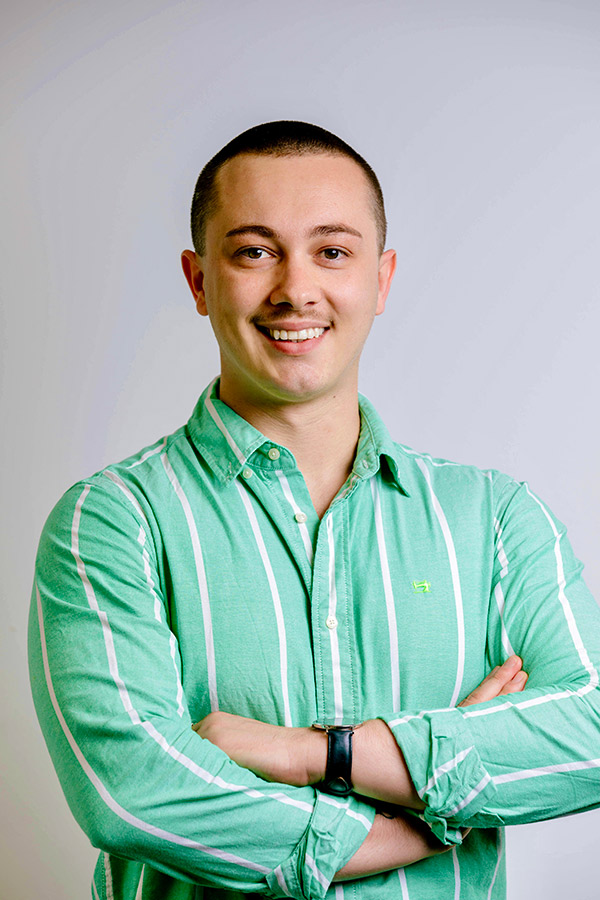
Meet Callyn Farrell. Callyn is currently completing his PhD within the UQ School of Psychology, primarily within the Early Cognitive Development Centre; a Centre devoted to understanding how babies, toddlers and young children make sense of the world around them.
What are your key research interests?
Developmentally relevant categories of language and how we use those categories of language towards children based on their gender. Further, the associations between these language categories and children’s social cognitive development. I also research how these associations occur for children diagnosed with developmental disabilities. My last research interest concerns how The Arts play a role in our development, daily lives, and well-being.
What inspired you to undertake a PhD?
The prospect of completing a PhD had always been a motivator for me throughout my undergraduate degree. Human cognition, behaviour and language have always been interests of mine throughout my life. So, I think the fact that a PhD allows an individual to develop expertise on a single topic or a single group of topics was very inspiring. The idea that I could study something that I wanted to investigate as an individual while being supervised by experts within a supportive and informed environment inspired me. The other motivating factor was the lack of research about how we use language with gender diverse children. This meant that a PhD offered an opportunity to understand how adults interact with diverse children and gain insight into the social cognitive development of gender diverse children. Collectively, these factors inspired me to undertake a PhD both for my own academic development and to understand the development of diverse children.
What is your PhD research project about, and why is this research important?
My PhD aims to investigate developmentally relevant categories of language and how we use those categories of language towards children based on their gender. The language category that I am specifically interested in is mental state language. Mental state language relates to talking about desires (e.g., I want…), emotions (e.g., they are happy) and cognitions (e.g., they know that...). Further, I am interested in the associations between mental state language and children’s social cognitive development. This research is important as currently we know very little about how mental state language is used towards gender diverse children. Research indicates that environments where mental states are discussed and explained (e.g., they are happy because they won the game) allow children to develop an advanced social understanding. Social understanding is important for peer relationships and social skills. Therefore, it is important for research to explore whether we use mental state language differently based on a child’s gender to understand if this has an impact on their development of social understanding. If we can understand these associations, we can work towards interventions that aim to overcome any inequity in the linguistic environments that diverse children develop within.
What pathway did you take into doing a PhD?
I completed the UQ Bachelor of Psychological Science in 2020. I had been working on an arts inclusion program for children diagnosed with developmental disabilities throughout my degree and had become acutely aware of the individual barriers to participation for families and children. As I approached the honours year of my program, I decided to reach out to experts within the School of Psychology who would be willing to supervise me as I undertook research that specifically aimed to understand the barriers to extracurricular participation for families who have a child diagnosed with Autism Spectrum Disorder. We had many meetings that allowed us to explore research topics, set student-supervisor expectations, and most importantly formulate a positive professional rapport. My supervision team here at UQ (Professor Virginia Slaughter, Dr Aisling Mulvihill, and Dr Michael Thai), are also experts within the field of children’s social cognitive development. Therefore, throughout my honours year not only did we discuss my project, but we also discussed and explored possible research pathways that investigated children’s social cognitive development and the language we use towards children to explain our social world. In short, it was through these additional discussions and supervision that a PhD topic developed. My supervision team have offered not only exceptional academic and research training, but also compassionate and considered guidance throughout both my honours year and my PhD. I credit their approach and conduct for forming a very organic pathway that allowed me to begin a PhD.
What do you enjoy most about being a PhD student?
I enjoy the ability to develop new skills and achieve milestones within a supportive environment. I also enjoy that fact that I get to work with a team that includes so many wise individuals who treat me with respect and believe in my potential.
What is one piece of advice you would give to someone thinking about studying a PhD?
Balance, ensure that you give space to your PhD, your professional development, and your passion projects. But most importantly, give space to yourself and those you value in your life.
What’s it like being a PhD student?
Being a PhD student is exciting. You get to develop both as a person and as a researcher. You also get to experience a range of academic, educational, and organisational aspects of research firsthand.



